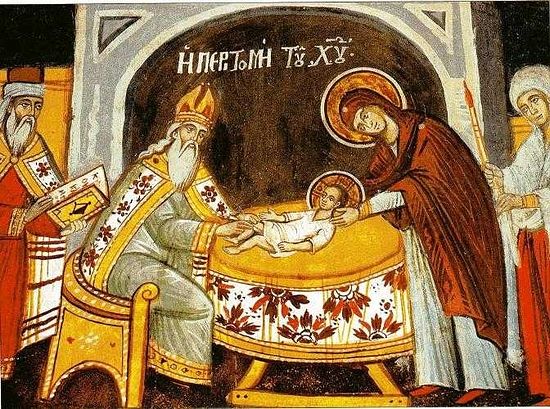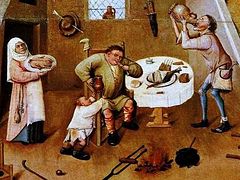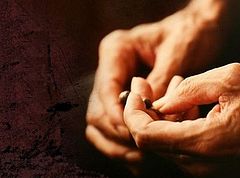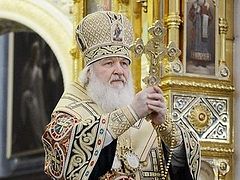 Archimandrite Iachint (Unciuleac; 1924-1998), abbot of Putna Monastery from 1973 to 1992, was one of the most revered Romanian spiritual fathers of the twentieth century.
Archimandrite Iachint (Unciuleac; 1924-1998), abbot of Putna Monastery from 1973 to 1992, was one of the most revered Romanian spiritual fathers of the twentieth century.
The words of Elder Iachint are filled with spiritual joy and the deepest humility, without which it’s impossible to understand the meaning of the feast of the Circumcision of the Lord. The rich spiritual gifts with which God endowed the Putna abbot were combined with his ever-present readiness to sacrifice himself for others. God immortalized this virtue of his forever, having taken the Elder to Himself in eternity when he, despite his illness, was hearing confessions l, trying to comfort and spiritually strengthen all who sought him out.
To comprehend the inexpressibly rich meaning of this present feast, enjoy the homily of Elder Iachint—which with its clear and vivid flow resembles the deep and wise talks of the Holy Fathers of antiquity, such as St. Basil the Great, whom we also celebrate today.
***
And when eight days were accomplished for the circumcising
of the child, His name was called JESUS (Lk. 2:21).
Beloved faithful!
Our good Savior, humbling Himself, took on a human body, not ashamed to fully obey the Law of Moses, which He Himself had given on Mt. Sinai. The first act of the Son’s obedience to the Father was His incarnation in the form of an Infant rather than an adult man. The first act of His obedience to the Law was to accept circumcision on the eighth day according to the Law of Moses, which says: And in the eighth day the flesh of his foreskin shall be circumcised (Lev. 12:3).
So, on the day prescribed by the Law, the Infant was circumcised, and the elder Joseph named Him Jesus, for so He was named of the angel before He was conceived in the womb (Lk. 2:21).
But why was Jesus circumcised, given that He wasn’t guilty of sin? First, to show Himself submitting to and fulfilling the Law. Then, so that it might be clear that He truly took on a human body and not a phantom. Third, to give us an example of the deepest humility. For He appeared not just in the form of a man, but as a Man Who overcomes sin, given that He Himself had no sin.
And why was He circumcised on the eighth day? Because according to the Holy Fathers (St. Gregory of Nyssa), the eighth day prefigures the day of eternity, the rest of the coming eighth age. The first six days are the days of creation, of labor. The seventh day is the day of the Lord’s rest—the day of the earthly Sabbath, which constantly passes away, like man himself, and therefore repeats itself every week. The eighth day is a symbol of the future age, the day of eternal celebration with Christ, which will never end. And the thirty-three days that the Infant Jesus was in Bethlehem until His presentation in the Temple, where He was held by St. Simeon the God-Receiver, represents the thirty-three years that God spent on earth before He crucified sin on the Cross.
But circumcision was not only a symbol of the covenant between God and man for the Jewish people (Gen. 17:10-14), but also of the redemption of ancestral sin itself—although the sin of Adam couldn’t be forgiven this way. Thus, circumcision was an Old Testament prototype of Baptism, and the Lord accepted circumcision to reveal Himself as the renewer of the Covenant, not its violator.
Our Lord Jesus Christ received three baptisms on earth: first, the baptism of the Old Testament—circumcision; then the baptism of repentance—of St. John, which also wasn’t perfect for it couldn’t grant the forgiveness of sins, but was neverthless higher than the old baptism because it established the connection between the Old and New Testaments; and the last and most perfect baptism that a Christian can receive on earth—that is, the baptism of blood, of martyrdom, which Jesus Christ Himself accepted on the Cross for our sake.
Beloved faithful!
Great was the Lord’s humility! After all, the All-Good God was not ashamed of our fallen body! He wasn’t ashamed of bodily circumcision. But the Lawgiver, Guardian, and Bearer of the Law desired to be touched and bloodied! Oh, the depths of Christ’s humility! He humbled Himself, accepting a perishable body. He humbled himself, becoming a tiny Infant and powerless before men, to show us that it is only by being reborn and becoming like innocent babes that we’ll be able to ascend again to Heaven from whence we have fallen. He humbled Himself, having been born in a manger of irrational beasts and in a strange land.
He Who is surrounded by hosts of angels in Heaven humbled Himself, giving Himself to be taken care of by the elder [Joseph]. He Who sits upon the fiery throne and upon Whom the Cherubim and Seraphim dare not gaze humbled Himself, giving Himself to be swaddled and touched by human hands.
He Who came to destroy human sins by drowning them in His own most precious blood humbled Himself, accepting fleshly circumcision, like sinners.
But why did our Savior humble Himself so deeply? Because human pride was too great, and this wound could be healed by nothing but the humility of Christ. Disobedience is cured by obedience, and pride by humility. And for such deep humility, God gave Him a name which is above every name, that is Jesus, which means “Savior,” that at the name of Jesus every knee should bow, of things in Heaven, and things in earth, and things under the earth; And that every tongue should confess that Jesus Christ is Lord, to the glory of God the Father (Phil. 2:9-11). As St. Peter himself testifies, Neither is there salvation in any other: for there is none other name under Heaven given among men, whereby we must be saved (Acts. 4:12).
Today, the Lawgiver is made the fulfiller of the Law to teach us perfect obedience. The Son of God becomes Man for the sake of man and reveals Himself as an Infant under the Law, in order to shame man, who transgresses the Law. While yet in Paradise, man had but one commandment from God—and even that he transgressed. But having descended to earth, the Son of God fulfilled all human commandments in order to heal Adam’s disobedience.
Today He Who touched Mt. Sinai and made it smoke is touched by the hands of a sinful man. But He doesn’t burn those hands, because he came to save man from the flames of eternal hellfire.
Today the sinless One has accepted the baptism of circumcision as an infant under the Law, to teach us that without baptism we can’t be cleansed from sin, we can’t be saved.
The perfect One received an imperfect baptism, and the imperfect receive the perfect Baptism unto sanctification. Jesus Christ received a feeble baptism, which He didn’t need. And Christians, called by His name, have received the perfect Baptism by the Holy Spirit that they also might become perfect.
Today, He Who names all of creation received a name above all names in Heaven and earth. Today, the Anointed One of God reveals His unknown name to us. Today, Emmanuel is revealed to man. Today, people for the first time call the Son of God Jesus , as He was named by Gabriel in Nazareth (Lk. 1:31). However, there the archangel pronounced the name and only the Virgin heard it; and here Joseph pronounces it, the Virgin repeats it, the shepherds hear it, Bethlehem learns it by heart, and the Magi spread it all over the earth. The nations learn about Him, the pagans begin to believe in Him, churches are erected in His name, and Christians carry His name in their hearts.
Oh, how dear under the sun is the name of Sweetest Jesus! By it, the Gospel of Christ is imprinted; by it the Church of the Living God is praised. With it, the Apostles go out to preach. Peter boasts of it in Rome. Paul is inspired by it before Caesar. The Christian peoples are comforted by it. It strengthens the faithful in times of trouble. Enemies are burned by it; demons are driven out of men and sinful spirits from their hearts by the frequent repetition of it. The name of Jesus is borne on the lips of mothers. It is a staff for exiles in their wanderings. It is incessantly repeated by monks in their humble desert. Hermits defend themselves with it, like a sharp sword, from unclean spirits in their beloved solitude. By the name of Jesus, the poor soften the hearts of the merciless. Virgins protect the secret treasure of their virginity by it as by a shield.
St. Ignatius bore the name of the Sweetest Jesus in his heart. His name, like a pearl hidden in the field of their hearts, was acquired by the saints through unceasing prayer and frequent repetition of it. The martyrs were armed with it when they were thrown into the flames of fire and to be eaten by wild beasts. By this name, Christian peoples are praised; by it the salvific Church is glorified; by it the clergy are strengthened; and by it enmity, hatred, lust, impure spirits, and every kind of sin are driven out of men. By the name of Jesus, sicknesses are healed, people are comforted, the wrath of God is averted, drought is banished, the harvests of the fields are ripened, bread is multiplied on the table, the house is filled with the joy of the Holy Spirit, enemies are reconciled, and our souls are saved.
Blessed and thrice-blessed are Christians, who repeat ceaselessly, or as often as possible, the short prayer of our Savior Jesus Christ: “Lord Jesus Christ, Son of God, have mercy on me, a sinner.” Blessed are those who have tasted of the sweetness of the name of Jesus, for they no longer experience any hardships in this foreign land!
Beloved faithful!
 The Lord Jesus Christ accepted circumcision to fulfill the commandment of the old Law. But in the law of grace, in Christianity, neither circumcision availeth any thing, nor uncircumcision, but a new creature (Gal. 6:15). That is, instead of circumcision, we must follow all the commandments of the Gospel, the main ones being love, mercy, prayer, and fasting.
The Lord Jesus Christ accepted circumcision to fulfill the commandment of the old Law. But in the law of grace, in Christianity, neither circumcision availeth any thing, nor uncircumcision, but a new creature (Gal. 6:15). That is, instead of circumcision, we must follow all the commandments of the Gospel, the main ones being love, mercy, prayer, and fasting.
But if the Lord Jesus Christ had no sin, did He need to be circumcised only in order to placate the Jews? After all, they didn’t believe in Him! No! The Lord was circumcised, that is, He submitted Himself to the old Law without hesitation in order to teach us to obey the law of grace without murmuring or doubting—that is, the Church’s dogmas, the sacred canons, the Gospel commandments, the teachings of the saints and guidance of our parents who gave us life, as well as the laws of the country in which we live.
All creations of God live according to certain Divine laws. Nothing acts by mere chance—neither the Heavenly angels, nor the stars of the heavens, nor the earthly creatures, nor the elements of the air. Even the demons don’t tempt a man without the knowledge and permission of God. And if God even “reserves the angels which kept not their first estate in everlasting chains under darkness unto the judgment of the great day” (cf. Jud. 1:6) because they opposed the will of God, then how will He spare us, Christians, Who have received the law by the disposition of angels (Acts 7:53), who know the Gospel by heart, the Church commandments given by Christ, but don’t keep them, but constantly violate them with our sins?
No, brethren. We can’t give any answer to this. We’ve broken the law, and we deserve to be judged and punished: either here—in sicknesses, temptations, sorrows, or there—in eternal torments. No sin will go unpunished. For every transgression and disobedience receives a just recompence of reward (Heb. 2:2). If we missed church without a good reason, then serious illnesses, discord, and eternal condemnation await us. If we disobeyed the priest, then we lose the blessing of God in our lives. If we opposed our parents or even yelled at them or hit them, then their curse won’t pass us by—that is, a sudden and grave death, and in the next world unquenchable fire. We’ve deprived our infants of life; we’ve resisted the commandment of God, which says: Be fruitful, and multiply, and replenish the earth, and subdue it (Gen. 1:28)—the wrath of God will surely overtake us both in this age and in the next. If we remember evils, if we don’t forgive others, thenwe won’t see the face of Christ.
So what should we do to avoid all this? Piously observe the laws of God, the decrees of the Church, the commandments of the Holy Fathers, the advice of our superiors, and follow the good example of those who bore us. Children should obey their parents, as the Infant Jesus obeyed the elder Joseph, despite the fact that he wasn’t His father. Parents must love and raise their children well, as they themselves were raised by their parents. Christians should obey their priest, as the angels in Heaven obey Christ.
We must all attend to our ministry. Everyone must fulfill their duties on earth—before Christ and the Gospel, before their family and neighbors, and before the society they live in. Let us also obey the authorities, for the powers that be are ordained of God (Rom. 13:1), as the Most Holy Virgin was obedient and went to the census in Bethlehem; as St. Paul was obedient, going to Rome. Let us obey our elders, let us have mercy on the young and love for all, for our love will never perish (cf. 1 Cor. 13:8). And not only that, but let us obey as befits us according to the law, and not outside the law of Christ. For no one is crowned, except he strive lawfully (2 Tim. 2:5).
If we live this way, then we will spend the coming year in peace and our whole life in spiritual prosperity and joy, and then we will enter the eighth age, that is, the Heavenly Kingdom, where we will ever be with the Father, Son, and Holy Spirit.
Amen.




